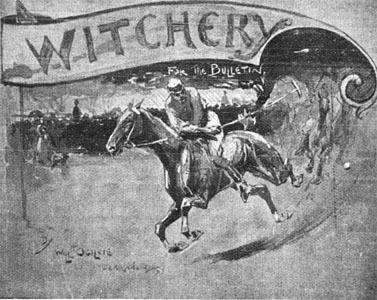We were challenged by The Dingoes -- they're the pride of Squatter's Gap --
To a friendly game of football on the flat by Devil's Trap.
And we went along on horses, sworn to triumph in the game,
For the honour of Gyp's Diggings, and the glory of the same.
And we took the challenge with us. It was beautiful to see,
With its lovely, curly letters, and its pretty filagree.
It was very gently worded, and it made us all feel good,
For it breathed the sweetest sentiments of peace and brotherhood.
We had Chang, and Trucker Hogan, and the man who licked The Plug,
Also Heggarty, and Hoolahan, and Peter Scott, the pug;
And we wore our knuckle-dusters, and we took a keg on tap
To our friendly game of football with The Dingoes at The Gap.
All the fellows came to meet us, and we spoke like brothers dear.
They'd a tip-dray full of tucker, and a waggon load of beer,
And some lint done up in bundles; so we reckoned there'd be fun
Ere our friendly game of football with the Dingo Club was done.
Their umpire was a homely man, a stranger to the push,
With a sweet, deceitful calmness, and a flavour of the bush.
He declared he didn't know the game, but promised on his oath
To see fair and square between the teams, or paralyse them both.
Then we bounced the ball and started, and for twenty minutes quite
We observed a proper courtesy and a heavenly sense of right,
But Fitzpatrick tipped McDougal in a handy patch of mud,
And the hero rose up, chewing dirt, and famishing for blood.
Simple Simonsen, the umpire, sorted out the happy pair,
And he found a pitch to suit them, and we left them fighting there;
But The Conqueror and Cop-Out met with cries of rage and pain,
And wild horses couldn't part those ancient enemies again.
So the umpire dragged them from the ruck, and pegged them off a patch,
And then gave his best attention to the slugging and the match.
You could hardly wish to come across a fairer-minded chap
For a friendly game of football than that umpire at The Gap.
In a while young Smith, and Henty, and Blue Ben, and Dick, and Blake,
Chose their partners from The Dingoes, and went pounding for the cake.
Timmy Hogan hit the umpire, and was promptly put to bed
'Neath the ammunition waggon, with a bolus on his head.
Feeling lonely-like, Magee took on a local star named Bent,
And four others started fighting to avoid an argument:
So Simonsen postponed the game, for fear some slight mishap
Might disturb the pleasant feeling then prevailing at The Gap.
Sixty seconds later twenty lively couples held the floor,
And the air was full of whiskers, and the grass was tinged with gore,
And the umpire kept good order in the interests of peace,
Whilst the people, to oblige him, sat severely on the p'lice.
Well, we fought the friendly game out, but I couldn't say who won;
We were all stretched out on shutters when the glorious day was done;
Both the constables had vanished; one was carried off to bunk,
And the umpire was exhausted, and the populace was drunk.
But we've written out a paper, with good Father Feeley's aid,
Breathing brotherly affection; and the challenge is conveyed
To the Dingo Club at Squatter's, and another friendly game
Will eventuate at this end, on the flat below the claim.
We have pressed The Gap to bring their central umpire if they can --
Here we honestly admire him as a fair and decent man --
And we're building on a pleasant time beside the Phoenix slums,
For The Giant feels he's got a call to plug him if he comes.
First published in
The Bulletin, 5 September 1896;
and later in
Rhymes From the Mines and Other Lines by Edward Dyson, 1896;
The Western Argus, 4 February 1897;
The Collins Book of Australian Poetry compiled by Rodney Hall, 1981;
My Country: Australian Poetry and Short Stories, Two Hundred Years edited by Leonie Kramer, 1985;
Old Ballads from the Bush edited by Bill Scott, 1987; and
Two Centuries of Australian Poetry edited by Kathrine Bell, 2007.
Author reference sites: Austlit,
Australian Dictionary of Biography,
Australian Poetry Library
See
also.

